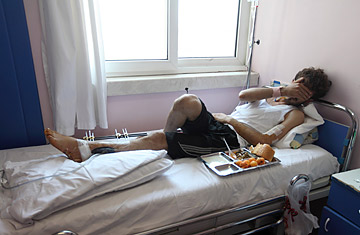
A Syrian man at a hospital in Antakya, Turkey, covers his face during an interview on June 9, 2011. The man said he was hiding his identity for fear of Syria's secret service
(2 of 2)
Ramy al-Dow's troubles started in earnest two weeks ago. In the summer, he and his family fled their native town of Jisr al-Shoughour, some 40 km south of Antakya, after his activist father was arrested by Syrian security forces in a raid. They joined the thousands of Syrians streaming into safety in Turkey, and soon settled in the Yayladagi refugee camp. Ramy continued to cross the border illicitly, ferrying food, water and other supplies to groups of Syrians huddled on the Syrian side, including more than two dozen military defectors in the tiny village of Ain al-Baida.
Two weeks ago, Ramy got a phone call from an associate of a Turkish Alawite businessman, a man he knew well. He'd seen him around Guvecci during the summer, offering food, water and shelter to Syrian refugees. "He said he wanted to help support the revolution, but that he couldn't discuss the matter over the phone," Ramy says. He and his cousin went to see the man in his home in a nearby village. "It was a trap," Ramy says. He claims he and his cousin were handcuffed and were pressed to enter a pickup truck. They resisted and a scuffle ensued, during which they managed to escape. After several hours, they made it back to Guvecci. More than 20 villagers saw the frightened, handcuffed pair. The Turkish businessman has reportedly told police that the young cousins were trying to sell him stolen smuggled weapons.
"I'm very scared. I can't go to Syria, and now I'm wanted in Turkey," Ramy says. "It's my word against a rich Turkish man's. I don't know what is going to happen to me. If there's a way I can get a guarantee that I won't be sent to Syria, I'll go to Turkish authorities and hand myself in."
A Turkish official familiar with the case says the young men have not been charged with a crime and have nothing to fear from Turkish law enforcement. "We have strong orders — very strict orders — not to detain Syrian guests or send them back to Syria. It's not possible. It might just be that we have some questions, that's all," he told TIME, requesting anonymity because he was not authorized to speak about the issue. The cousins "should go back to the camps."
But they won't. It doesn't matter that they haven't been formally charged, their fear of men in uniform runs deep, such is the formidable psychological barrier of fear cultivated by Assad and his father and predecessor Hafez Assad in the decades they have ruled.
In any case, many of the residents of these refugee camps don't feel any safer than the Syrians living outside the wire. There are six camps in all, housing some 7,500 Syrians. About 3,800 are in Yayladagi, just kilometers from the border. It's a well-organized, clean camp with white tents pitched along paved walkways. "We won't leave the camp and go into town alone anymore," says Nihad Hashari, a 45-year-old from Jisr al-Shoughour staying in Yayladagi. "We organize groups of four or five."
Hashari sits with about a dozen men on plastic chairs under a white canvas awning. They are all immensely grateful for the Turkish government's help, and for Prime Minister Recep Tayyip Erdogan's blistering attacks on Assad, but they fear that there are spies in their midst. "We have noticed cars of Syrian intelligence in the town," says another refugee, Mustafa. "We know that they are intelligence because their plates are either all zeros or there are several cars with consecutive numbers and Damascus plates."
The Turkish official acknowledges that possibility but says there is little his government can do about it. "We cannot know who is mukhabarat," he says. "The camps are open to everybody. We do not ask why you are coming or why you are leaving. If [the camp residents] say, 'This person is mukhabarat,' we become more careful. There are some allegations about people, but we cannot prove it. What are we supposed to do?" he says, becoming exasperated. "Please offer us a solution, and we will do it. Should we interrogate all of the refugees?"
The Dow cousins don't have solutions to offer. They just know that they'll be spending another night out in the open. "Sometimes we stay in homes, but we don't want to jeopardize anybody else," Ramy says, as he and his young cousin make their way down a gravel pathway toward fields of olive and pomegranate trees. They have one blanket between them. Ramy doesn't even have a jacket. "Don't worry about us," he says cheerfully. "We're used to hardship here and over there," he says, nodding toward the nearby border. "We'll be fine, as long as they don't find us."
